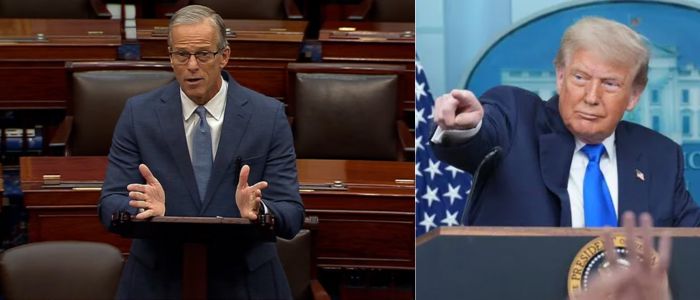The extra time means Republican government can work out the final details of the bill, while Democrats will try to pick apart politically vulnerable parts and engineer the politically difficult recording of votes. The votes are likely to have campaign consequences down the road.
Senate Majority Leader John Thune said it’s unclear whether Republicans have the votes needed to pass the bill, adding that the process “may take a little while.” Orchestrate huge tax cuts for the federal government, pump up spending on the Pentagon and border security, and slash safety-net programs, including Medicaid.
These proposed safety-net cuts have been a point of focus for Democrats to resist the bill. Over the weekend, they derailed progress by demanding that the entire bill be read aloud, which took more than 12 hours.
There is a need to act quickly to pass a bill, with the president insisting that he must have it on his desk by July 4. But if the us Senate polls does so, the bill must go back to the House, where Speaker Mike Johnson is up against opposition in his ranks.
GOP Cuts a Wedge Among Democrats With Medicaid, accuses White House KOLB.
Supporters of the bill want to cut Medicaid and this is the most contentious part of the bill. Republicans from both chambers are closely watching for any changes to those provisions. Details: Senator Lisa Murkowski (R-Alaska) sided with Democrats over Medicaid, the Supplemental Nutrition Assistance Program (SNAP), and rural hospitals over the weekend. While it failed, they ended up exposing some rifts among Republicans.
11.8 million Americans likely to lose health insurance under Senate health bill by 2024, CBO says That is even more than the 10.9 million under the House version, the Congressional Budget Office (CBO) has projected. Medicaid would be cut by $930 billion over a decade — a nearly 25 percent reduction from projected spending in that period — and spend even less on the program in the long term. Another proposal includes between about $750 billion to $800 billion in cuts, which is the equivalent of the number in the House-passed bill.
The Senate would also tighten work rules for able-bodied adults ages 19 to 64, including parents of children above 14. The House bill, meanwhile, leaves out of the program the parents of dependent children. Other provisions are changes to state taxes and provider payments that would apply only to states that expanded Medicaid.
GOPTax Debate Under Way As Deficit Concerns, Policy Scoring Prompt Debate
The bill’s cost has ignited a heated debate over how much the expense is. The Senate’s first vote on Monday was on a “current policy baseline” approach that Trump and some Republican government leaders such as Senate Finance Chairman Mike Crapo support. The House approach would reduce the bill’s deficit impact by eliminating the cost of extending a package of tax cuts from 2017.
But the CBO relied on its standard “current law baseline” approach, which presumes that those tax cuts will expire as planned. Under this accounting, the Senate bill would add nearly $3.3 trillion to the federal deficit over a decade — even more than its counterpart in the House of Representatives.
The costlier Senate bill can be explained by the bigger tax cuts and reduced spending cuts, experts said. It would extend permanently three corporate tax cuts in the 2017 law, and reduce planned cuts to food stamps. Using the alternative scoring approach, the CBO projected that the new version would cost $508 billion over 10 years.
Politics

Senate Pushes Trump’s Policy Bill in All-Night Voting

The us Senate polls has begun an arduous, overnight voting session on the Republicans’ sweeping bill to overhaul the nation’s domestic programs after a weekend of delays and partisan negotiations. The session, a so-called vote-a-rama, started at 9:35 a.m. on Monday and stretched into Tuesday, with no clear end in sight.















